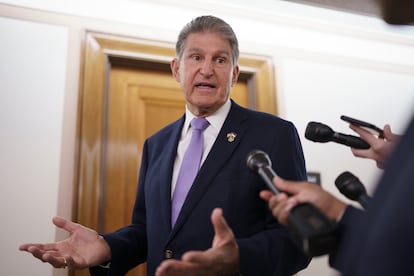Democrats unlock Biden’s economic plan thanks to maverick senator’s reversal
The legislation, which includes measures against climate change and a tax increase for the wealthy, gives the party a breather before midterm elections in November


The Democratic Party has reached an agreement with Senator Joe Manchin III of West Virginia, a centrist, to unblock a watered-down version of President Joe Biden’s star spending plan.
Democratic senator Chuck Schumer, the majority leader, reached a deal with Manchin on Wednesday for a legal package that had seemed doomed to failure after months of comings and goings. The package includes tax reforms that will affect multinational companies and the highest earners, measures to combat climate change and to increase security energy, more affordable prescription drugs and a cut in the deficit.
The plan is slated to be voted on in the Senate next week, just before the August adjournment of sessions on Capitol Hill. If it passes, and everything indicates that it will, since the Democrats have enough votes, it will provide some relief for Biden, whose economic agenda is stuck while his popularity ratings hit rock bottom.
The so-called Inflation Reduction Act does it look too much like Biden’s famous Build Back Better Plan, which promised $3.5 trillion worth of spending (later reduced to $2 trillion). But this new deal, which foresees energy spending worth $369 billion and $64 billion on health, at least ends months of bitter internal dispute within the party, just in time for the legislative elections in November. In these, the entire House of Representatives and a third of the Senate will be up for grabs. For an administration showing the wear and tear of a year and a half, it will be something to present to Democratic voters.
“Build Back Better [which was a key slogan during the 2020 presidential campaign] is dead,” Manchin stated in an extensive statement made public in the afternoon in which he did not offer details about what was agreed. “Instead, we have an opportunity to strengthen our country by bringing Americans together.” The plan promises to cut the deficit by some $300 billion, as well as reducing carbon emissions by 40% by 2030.
Manchin is a senator from a traditionally Republican state, West Virginia, that is heavily dependent on coal, and where he has successfully run in several consecutive elections with a centrist profile. His defense of those energy interests, and of the jobs of his voters, has collided with the aspirations of Biden’s green agenda.
Manchin is also the member of the Senate who has received the most donations from the oil, coal and gas sector, according to data compiled by OpenSecrets, an organization that controls the relationship between economic and legislative powers. His opposition to the president’s plans was also based on concern about the effect of spending on inflation, which is at 9.1%, a level not seen in more than four decades.
It is not clear what made him change his mind. Weeks ago he said he would not back the plan until he saw new economic data. In his statement, Manchin does not explain what these data are and how they have persuaded him.
Manchin has become one of the most influential senators in Washington by reining in the drift to the left of the Democratic Party that Biden promised when he entered the White House. He demanded the reduction of unemployment benefits in the stimulus plan promoted in the first days of the Biden administration, knocked down the appointment of the budget director, Neera Tandem, and, in 2018, he voted in favor of the controversial appointment of Supreme Court Justice Brett Kavanaugh.
The Senate is split down the middle, with 50 seats on either side of the party line. Democrats have Vice President Kamala Harris’ tiebreaking vote.
Tu suscripción se está usando en otro dispositivo
¿Quieres añadir otro usuario a tu suscripción?
Si continúas leyendo en este dispositivo, no se podrá leer en el otro.
FlechaTu suscripción se está usando en otro dispositivo y solo puedes acceder a EL PAÍS desde un dispositivo a la vez.
Si quieres compartir tu cuenta, cambia tu suscripción a la modalidad Premium, así podrás añadir otro usuario. Cada uno accederá con su propia cuenta de email, lo que os permitirá personalizar vuestra experiencia en EL PAÍS.
¿Tienes una suscripción de empresa? Accede aquí para contratar más cuentas.
En el caso de no saber quién está usando tu cuenta, te recomendamos cambiar tu contraseña aquí.
Si decides continuar compartiendo tu cuenta, este mensaje se mostrará en tu dispositivo y en el de la otra persona que está usando tu cuenta de forma indefinida, afectando a tu experiencia de lectura. Puedes consultar aquí los términos y condiciones de la suscripción digital.








































